USA Scientist Receives $300,000 Grant for Alzheimer’s Study
Posted on July 17, 2024

A University of South Alabama scientist recently received a $300,000 grant from the Coins for Alzheimer’s Research Trust.
Dr. Amy R. Nelson, an assistant professor of physiology and cell biology in the Frederick P. Whiddon College of Medicine, accepted the award at the Trust’s 2024 annual board meeting in Columbia, South Carolina. Nelson and other awarded scientists gave presentations about their research at the meeting.
The award will support Nelson’s lab to begin a new pilot study on a highly understudied protein known as caldesmon, a protein that limits cells from contracting. The lab team found that the levels of caldesmon are reduced in brain pericytes in brain tissue from Alzheimer’s disease patients. Pericytes and vascular smooth muscle cells, collectively known as mural cells, cover endothelial cells that form the inner lining of blood vessels. Pericytes regulate blood flow in the brain and are essential in maintaining the blood-brain barrier.
It is known that there is reduced blood flow and a loss of pericytes in the brain in Alzheimer’s disease, but why this happens remains to be determined and is the focus of Nelson’s project.
“We aim to conclusively determine whether the levels of pericyte caldesmon are reduced in Alzheimer's disease brain, and the functional consequence of caldesmon being reduced in experimental models,” Nelson said.
Named the John Trojanowski Memorial Grant, the award honors the late Dr. John Quinn Trojanowski, M.D., an American academic research neuroscientist specializing in neurodegeneration. He and his partner, Dr. Virginia Man-Yee Lee, are noted for identifying the roles of three proteins in neurodegenerative diseases: tau in Alzheimer's disease, alpha-synuclein in Parkinson's disease, and TDP-43 in Amyotrophic Lateral Sclerosis (ALS) and frontotemporal degeneration.
“Receiving this award from the Coins for Alzheimer's Research Trust was a bittersweet moment for me because I had the fortune of meeting and collaborating with Dr. Trojanowski and Dr. Lee,” Nelson said. “I admire their scientific contributions on neurodegenerative diseases and look up to them as role models.”
At a reception preceding the annual board meeting, Nelson had the opportunity to meet volunteers and Rotary Club members who support grants related to Alzheimer's disease.
“These are individuals whose lives have been touched by this horrible disease put a substantial amount of effort into raising funds towards a cure for Alzheimer's disease,” she said.
In 1995, the Sumter Rotary Club in South Carolina initiated the effort to prove that Rotarians voluntarily emptying their pockets of change for a good cause could produce significant levels of funds to support Alzheimer’s disease research. The Coins for Alzheimer’s Research Trust Fund was the name given to the project. Today, the trust is supported by nearly 400 Rotary Clubs across the United States.





